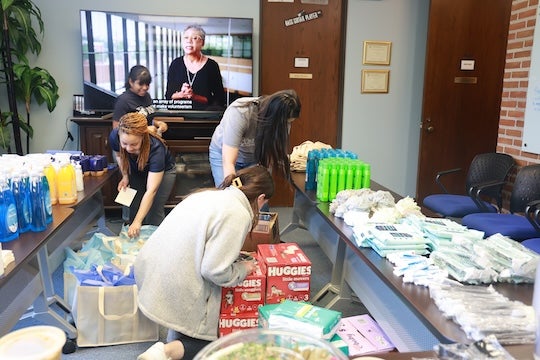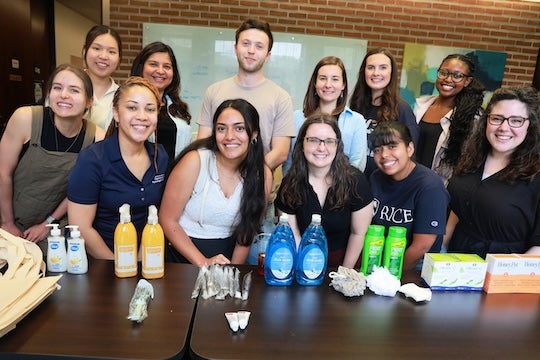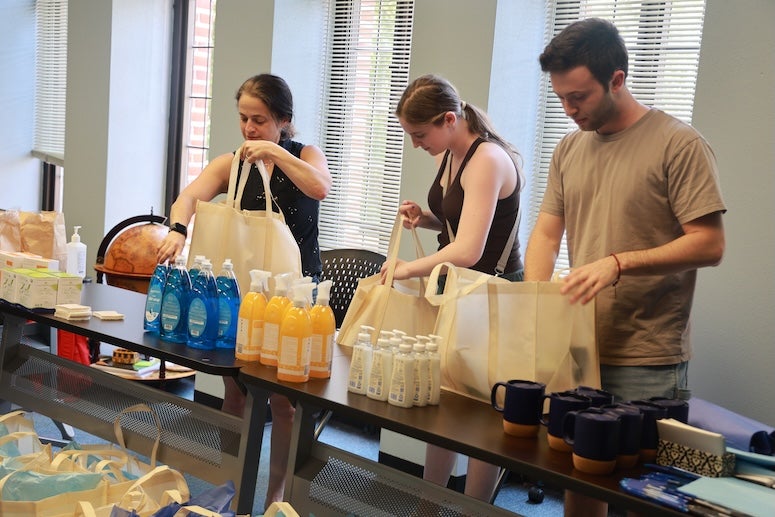It was an afternoon filled with purpose. The Howell Conference Room in Sewall Hall was lined with tables covered in toiletries, cleaning supplies, diapers and other essential items — everything needed to prepare care packages for refugees starting new lives in Houston.

“We take so much for granted,” graduate student Sabrina Cuauro said. “These are basic essentials for us, but for many of these families, this care package means everything. It’s a small thing that can make a big difference in their lives. To be able to give that to someone is a privilege for us but also a blessing.”
In April, volunteers from the Department of Psychological Sciences came together to assemble the gift bags and write personal cards for those supported by Interfaith Ministries of Greater Houston. The organization’s Refugee Services plays a critical role in helping refugees fleeing persecution find safety, stability and hope in Houston. Each year, the organization assists over 1,500 refugees from more than 50 countries, providing support with housing, education and employment services.
“This kind of community support is essential,” said Praveena Lakshmanan, community engagement program manager for refugee services at Interfaith. “While resettlement agencies focus on immediate needs like housing and employment, it’s deeper engagement — like that from Rice University — that helps refugees thrive, not just survive. It’s this partnership, rooted in inclusion and empowerment, that truly transforms the refugee experience.”
This event wasn’t just about giving back — it was also an opportunity to strengthen the department’s connection with Interfaith, a longtime community partner. One of the key links between the department and Interfaith is Chase Lesane-Brown, director of experiential learning and lecturer in the School of Social Sciences. She teaches a course that directly engages students with the refugee community, allowing them to volunteer and gain hands-on experience with refugee resettlement issues. Lesane-Brown’s ongoing partnership with Interfaith helped make this outreach event possible.
“Diversity of the Houston community was one thing that drew me to Rice nine years ago,” Lesane-Brown said. “It is both an honor and a privilege to connect what I do in the classroom with local organizations to support this vibrant community. As researchers, lecturers and students, it is essential we give back to the community that inspires us. Staff at Interfaith are incredibly dedicated, and the work they do to support Houston’s refugee population is awe-inspiring. Their work looks effortless, but we know it is not, especially in the face of recent and unjustified budget cuts. I am grateful we had the opportunity to contribute to their vital mission.”

Volunteers packed essential supplies like soap, deodorant and shampoo into bags, each one accompanied by a hand-written note of encouragement. These small acts of kindness aimed to provide not just material support but also a sense of hope and belonging for families who are rebuilding their lives after fleeing hardship.
“This is just one of the many things we’re doing as a department to serve the community,” said Danielle King, associate dean for graduate and postdoctoral studies and associate professor of psychological sciences. “But supporting the refugee population at this moment is something that resonates deeply with many of us, and it’s something we believe we can make a real impact on.”
This outreach event was part of the department’s broader mission to engage with the community. For students, staff and faculty, it was an opportunity to connect with a cause that touches many in the department.
“My research focuses on immigrant communities,” Cuauro said. “For all of our projects, we work closely with community members to include them in the process — creating surveys, conducting interviews and tailoring our work to their needs. But research, by its nature, is often long term. This event allows us to see the immediate impact of our actions and make a difference right now.”
“Through events like this, we continue to build strong community ties,” King added. “It’s an opportunity for us to give back, use our resources and contribute to making a positive impact in the lives of others.”

